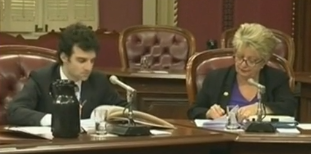Quebec: How Charest made us running in circles for nine years reflects history
With the race to the booths
that may add another page in history only hours away, the hearts of Quebecers
are thumping in what our future may bring. Although, doesn’t this room look
familiar to anyone, despite the newly painted walls?
A film on Les Patriotes (1999)
Wait, so the same
people the Liberal Party were fighting against back then are the ones
representing the party of today? Yes.
Montreal 1968 Montreal 2012
Montreal had the first
metros built in 1968 thanks to Mayor Jean Drapeau. Boston saw the first
underground subway line in the United States by 1897, which means La Belle
Province would stay behind by 71 years in terms of revolutionizing
transportations, amongst other things.
To note, during the 19th
century, the Liberal Party was founded after the values of Louis-Joseph Papineau
and Chevalier de Lorimier- Les Patriotes. These Francophone activists were
fighting for equal rights in Lower Canada. They were oppressed by the Loyalists
to the British Monarchy that ruled Canadian government at the time.
Present Liberal leader Jean
Charest, who began his career as a member of the Progressive Conservatives of
Canada (1984-1997), essentially brought conservative views to a party that was
originally founded on centrist values. Simply observe Bill 78 that violates the
Charter of Rights and Freedoms, and his main concern supposedly being the
economy, despite the thousands of job cuts made in 2012.
Reflecting back on the
20th century, women in Quebec only gained the right to vote in 1940, compared
to Ottawa, which gave that right by 1884. In our 2008 provincial elections,
only 57% of the entire population participated in voting at all.
Throughout the 1950s,
student unions fought to make higher education accessible, today unions are
fighting to keep it that way. Suddenly, women had the right to work and file
for divorce, and schools were no longer controlled by the Church.
Life changed overnight
that decade. Former Radio-Canada journalist and ex-Liberal candidate René Lévesque gave hope to unrepresented Francophones by starting Le Parti
Québécois. However 1970 saw much turmoil during the October Crisis, which
tarnished how Francophones are seen today.
It seems Quebec began
to move forward in the Quiet Revolution, but somehow we remained trapped there
and are continuing to fight for what our grandparents did. Who has held us
back? For one, the Federal Government hasn’t been all that kind.
Yes, our language is
recognized in the constitution; however it is frowned upon and treated as Latin
since we’re the only 2% of French speakers in North America. Every time this
argument is made Quebec is considered as being non-accepting.
For one, our province
favored keeping the gun registry, the Kyoto Protocol, but those decisions were
ignored. Instead of living collectively as a country, Prime Minister Harper
only recognizes Quebec when the word referendum is mentioned. Is this not why
58 NDP seats were created in our backyard?
On one hand, the
referendum argument may seem like old thinking; on the other hand it is old
unresolved issues that still show resentments in the throats of many. Quebec
has a long history of political activism for a reason.
The highest taxes in
the country, the largest bureaucracy, and we also see one of the lowest minimum
wages at $9.50/hr. The Federal government does provide much money, but that
only scratches the surface of the real issues.
Nevertheless, when the
youth are standing up to keep our admired education system as is, we are “entitled”.
The sad truth, maps may show Canada as one, but we have always been somewhat
separated.
Languages are what
define us and creates job opportunities. Education, the environment, and health
care are all endangered because old views and bickering are put ahead too often.
Each province has their own identity, yet Quebec distinction is still bitter to
some. Why?
Some would vote for
Jean Charest or Francois Legault simply because they might represent
Anglophones better, but ask, do they represent their views? Likely not. Looking at these
party platforms, they are not the most modern of politicians. An Anglophone can
vote for a Francophone party, as vice-versa can be acceptable too.
Legault’s focus
involves 10,000 job cuts to Hydro, unrealistic mandates such as one doctor per
family, when the shortage of doctors claims otherwise. His focus on education
seems reflective of Maurice Duplessis. He and Charest might as well be two peas
in a pod.
As Oscar Wilde claimed,
“What is a cynic? A man who knows the price of everything and the value of
nothing.”
Whomever one votes for
tomorrow, be sure it’s a government representative of one’s values that can
bring us forward and realize the goals created during the Quiet Revolution, to
welcome an era where the voice of a generation will finally be heard.
Want to join the discussion? Like, Circle, Follow The Quebec Political Scene!
Subscribe to:
Post Comments (Atom)














No comments:
Post a Comment